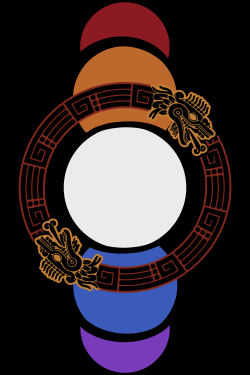Table of Contents
Tlayahucoatl
Tlayahucoatl is a minor deity worshiped only in Itlan-Youali. They have no gender and little discrete personality to speak of. In visions, this god appears as a massive serpent with two heads consuming its own tail, and has never spoken even to their most devout followers. Despite this, the power of Tlayahucoatl appears to be very real. A depiction of Tlayahucoatl is featured on the flag of Itlan-Youali.
Tlayahucoatl is a conglomerate deity of the gods Ra, Rudri, Anubis, Isis, and At'ena.
Origins
According to ancient Zinaparan and Tonatiu legends, Tlayahucoatl is the being that commands the string of fate itself and keeps the world in constant motion. They are represented by a two headed snake moving in a circle as if dancing with itself. Anything that fits within the nature of cycles falls under the domain of Tlayahucoatl, including the dawn and dusk, life and death, and fate itself. In the modern age, worship of Tlayahucoatl has diminished greatly in Splint and is only really observed by natives of Zinaparo. However, the faith is still incredibly strong and influential in Itlan-Youali.
Priesthood
The priests of Tlayahucoatl are either chosen by the existing high priests or are born into the position through the cycle of reincarnation unless they have been excommunicated. When becoming a priest of Tlayahucoatl, initiates must choose a domain for which they have a particular affinity, joining a specific chapter of the faith unique to that domain, which each chapter having their own duties. The five domains are Light, Darkness, Life, Death, and Fate.
Domain of Light
Priests under the Domain of Light are the primary caretakers of sunlit life and are the arbiters of all deeds done under the light. These individuals hold the sun in great importance and almost always have a form of gold obsidian jewelry on them to link them directly to its light. Furthermore, priests of this domain often team up with the Domain of Life to ensure the health of the jungles and its environments, ensuring everything gets what it needs. When night falls, priests of this Domain trade out duties with priests in the Domain of Darkness.
Domain of Darkness
Priests under the Domain of Darkness are very similar in their duties to the Domain of Light, being the caretakers of moonlit life and are arbiters of all deeds done under the cover of night. These individuals hold the moon and shadows as paramount and tend to have to deal with the most amount of crime, mostly involving spats in taverns from people having one too many drinks.
Domain of Life
Priests under the Domain of Life are responsible for taking care of the living, ensuring that everything is healthy and well taken care of. These priests act as medical professionals, caregivers, therapists, and environmentalists alongside the Domain of Light ensuring that all life is taken care of while it continues to live.
Domain of Death
Priests under the Domain of Death are responsible for taking care of the dead and assisting individuals on their way to enter under their Domain. These priests act in a very similar capacity to the Domain of Life, as medical professionals, caregivers, and therapists. However, their field of expertise tends to extend more towards the end of life than the beginning. However, their job is not finished there as they are also responsible for the vast hibiscus fields and ensuring that each body is properly marked so when it comes time to be reborn, the previous body and associated flowers of the soul can be found.
Domain of Fate
Priests under the Domain of Fate are responsible for keeping the other domains in balance alongside keeping proper calendars and records of everything that is happening in the world. These priests are high judiciaries, record keepers, and timekeepers, ensuring Itlan-Youali continues to run smoothly and that the cycle is never tilted off balance.
Religious Ceremonies
Cycle of Light and Dark
The Cycle of Light and Dark is a bi-daily ceremony held by the Domains of Light and Darkness at varying times of the day. The Domain of Light will lead this ceremony when the Sun begins to rise and the Domain of Darkness will lead it when the Moon rises. This ceremony involves priests of the leading Domain finding a priest of the other Domain and saying “The (Sun/Moon) has set, you may rest” and taking their place. This effectively acts as a means of changing the guard between the day and night.
Cycle of Reincarnation
A key part of belief in Tlayahucoatl is that the soul endures even if the body dies, and that the body is second to the soul in importance. When a soul is reborn in a new body, upon reaching the age of maturity of their race a priest of the Domain of Life and a priest of the Domain of Death will lead the individual to where their previous body was buried, asking for them to drink hibiscus water made from the nutrients of their previous body, completing the cycle.
The use of hibiscus is notable as it resembles blood when turned into a drink alongside it using the body it was grown on as fertilizer for its growth, taking the energy from the decomposing body and returning it to its soul.
Furthermore, Tonatiu have rather open views around individuality and identity, as the body is second to the soul. If there is a disconnect between the soul and the body, then the body must be changed to accommodate the soul within it, and in finding a partner, the soul of the person you love is more important to their appearance. Because of this, people in Itlan-Youali are much quicker to judge someone on their merits and personality over their appearances.
Finding of the Spark
This is a ceremony that is done close to childbirth that is tied very closely to the Cycle of Reincarnation. In this, a priest of the Domain of Life, Death, and Fate all convene and examine children who had been recently born, looking for the spark of who they once were in their eyes. Once a child is found in this way, they are given the name of their previous life. If a child has no spark, then they are considered a Yankiuk Soul or a new soul.
A soulless child is treated with pity and hope in equal measure, as the Tonatiu believe that a soulless individual - while they are separated forever from the holy cycle of death and rebirth, is destined to complete all they must in the single lifetime they have. Soulless children are exceedingly rare in Itlan-Youali, however.
Naming of Yankiuk
If a child is found and deemed a Yankiuk Soul, then that child is taken with their parents into the local temple to meet with a priest of the Domain of Fate to discuss the name of the child. This is done by the priest looking into the weave of fate of the child and discerning a potential path in life for them. Then, with this in mind, the priest and the parents all decide on a name for the child.
Joining of Souls
A ceremony of joining hosted by a priest of the Domain of Life and Death, offering wedding rites to those that wish to be wed to one another. During this ceremony, the two to be wedded are taken to a private room in the local temple where the actual ceremony takes place, involving each individual taking a drop of their blood and putting it into a chalice of water from the nearest cenote, with both people taking a drink from the chalice. Upon the completion of this, the souls are joined and the marriage is complete.
After this ceremony is complete, the couple is taken into the public in front of their families and the priests officially announce the souls as joined for this cycle, after which the married couple is released back into the care of their loved ones for parties and celebrations.
Planting of the Body
When someone dies, a priest of the Domain of Death will be called to collect the body, taking it to the local hibiscus fields and finding a suitable place to bury them, often the same place as their previous body. The location of the burial is then marked and hibiscus seeds are planted atop the body to grow for use in the Cycle of Reincarnation ceremony.
Ullamaliztli
Ullamaliztli is a game and religious ceremony held by the Domain of Fate for those that wish to see their family’s fates changed through blood. This is a game played in a narrow pit with a rubber ball and the objective of the game is to pass a rubber ball through two stone hoops with the elbows, hips, knees, or shoulders without the ball touching the ground. Teams vary in size, but tend to range from 3-5 voluntary participants, and the winning team is composed of those who are considered “Chosen by Tlayahucoatl.” These Chosen are then sacrificed, and with their blood the fates of their families are changed for the better, their families ascending to nobility for eight generations.
However, ullamaliztli is played casually and is seen as a pastime or as a means of conflict resolution without coming to blows, with the actual act of sacrifice only occurring once every eight generations.
Festival of Rabbits
In celebration of Spring and the return of fertility to the land, the Festival of Rabbits is held throughout all of Itlan-Youali to commemorate the yearly cycle beginning once again. This festival involves massive parties, revelry, and alcohol. This festival is also one of the few traditions that has survived in Splint as well, though it has lost a lot of the religious undertones and is simply a day where everyone parties.
Spells of Tlayahucoatl
A priest of Tlayahucoatl may, in mechanical terms, be a Ra'ite, Rudrite, Anubian, Isisite, or At'enite. They gain access to all the spells and skills of that priesthood. They must follow the tenets of this priesthood as normal as well as hold up the values of Tlayahucoatl worship. A DI check to their god will call for the silent and enigmatic Serpent of Cycles instead of the requisite Jaernian deity.
A follower of Tlayahucoatl may freely dual-priest into any of the other four listed deities, even if this would not normally be possible for a regular priest - e.g. a Tlayahucoatl devotee of the Light domain may attune into a Rudri group, even though a typical Ra'ite could not.


